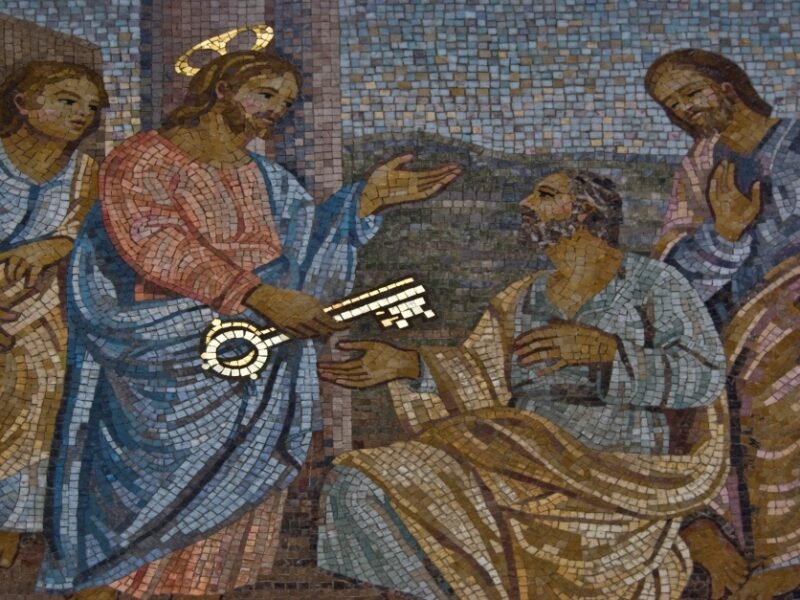The self-evident focus of Article XVI is the possibility of repenting from post-baptismal sin and, to an extent, the nature of “sin against the Holy Ghost.” Yet it is in the context of this Article, rather than Article XVII (“Of Predestination and Election”), that Browne chooses to discuss extensively the doctrine of final perseverance:
The question of the possibility of falling from grace may be considered as intimately connected with the doctrine of God’s predestination, and therefore might properly come under the XVIIth Article. Yet, as it is certainly in some degree treated of in this Article, and may be separated from the question of predestination, we may not refuse to consider it here.
The topic of final perseverance—and, indeed, the larger subject of predestination—is too large to address comprehensively in a commentary such as mine. I will therefore confine myself to making a few comments about the doctrine’s place in the Articles. Although Browne argues—convincingly, to my mind—that both Scripture and the Anglican formularies favor the view that one can fall away from grace finally,[1] whether the Articles require this belief is another matter. Several commentators maintain that the Articles are incompatible with Calvinism in general and the doctrine of final perseverance in particular, as exemplified by Edmund Tyrrell Green:
Calvin’s teaching…is altogether irreconcilable with the doctrine of our Church. He taught that Divine Grace, where it is really given, is irresistible, and therefore that the elect who have been once justified, and have received the gift of the Holy Spirit, can never fall from grace; if a member of the Church fall away, his fall must be considered a proof that he is not of the number of the elect, and that he never in reality received saving grace.[2]
Final perseverance has been argued to be not merely a crucial part of the Calvinistic system, but its only true distinctive.[3] For the Articles to positively exclude it, then, would be tantamount to the exclusion of Calvinism from the Anglican church. Browne, however, is more circumspect, as he grants that the question is “possibly not expressly determined by the wording of this Article.” This is in keeping with his earlier observations that the Articles probably “speak the language neither of Calvin, nor of Arminius,” and that the Formularies in general were constructed “so as to include as many as possible within the pale of the National Church.” Browne makes comparable statements about Article XVII, writing that “it seems worthy of consideration, whether the Article was not designedly drawn up in guarded and general terms, on purpose to comprehend all persons of tolerably sober views”:
I am strongly disposed to believe that Cranmer’s own opinions were certainly neither Arminian nor Calvinistic, nor probably even Augustinian; yet I can hardly think that he would have so worded this Article, had he intended to declare very decidedly against either explanation of the doctrine of election.
Browne is not alone in this regard, as other commentators have also expressed a similarly expansive view of the Articles: “There is no doubt but that Calvinists and Arminians agreed about the wording of this article [XVII]; and why they should not agree about it now, I know not.”[4] It is therefore not a stretch to say, as Browne does, that while Article XVI and other parts of the Formularies suggest that saving grace can be forfeited finally, they are not so definite as to shut out the opposing view.
Now it could be objected that even if Article XVI does not rule out the doctrine of final perseverance, the traditional Anglican belief in baptismal regeneration as found in Article XXVII does, a view articulated by Bishop A. P. Forbes: “A Calvinist cannot look upon Baptism as of any vital importance…for he will not grant that grace reaches any but the elect, and as all are not elect, there are many who are baptized who never receive grace.”[5] The logic of final perseverance, we are told, precludes any belief in baptismal regeneration, with the reverse also being the case. Archdeacon Montagu makes this argument when he says the incompatibility of these two doctrines follows from the fact that “many…baptized children, when they come to age, by a wicked and leud life do fall away from God, and from that state of Grace and Salvation, wherein hee had set them, to a worse state; wherein they shall never be saved.”[6] That said, Browne points out that historically there have been many who affirmed both doctrines together:
The most rigid form of Calvinism might make [a contradiction between baptismal regeneration and final perseverance] inevitable. Yet very high predestinarians have thought otherwise. Augustine held that persons might be predestined to grace, but not to perseverance; nay, that they might be ordained to persevere for a time, yet not to the end. Calvin himself does not seem to have held his doctrine of perseverance so rigidly as to make it impossible that God should give some degree of aid to such as reject it. At all events, many, who have followed him a great way in his predestinarianism, have believed that grace might be given in baptism, yet rejected and forfeited by sin. Of such was our own Hooker,[7] and many other of our most eminent divines.[8]
Two other notable Anglicans who sought to demonstrate the compatibility of baptismal regeneration and final perseverance are Bishop Davenant and Samuel Ward, who both “stood behind the Dortian definition of perseverance while simultaneously advocating an automatic grant of salvation in baptism.”[9] Calvin himself, as Browne notes, is difficult to categorize with regard to his doctrine of baptism: “Certainly, in some of his later works, he speaks much more favourably of the grace of baptism; as though, when off his favourite system, he were constrained, by the evidence of Scripture, to attach more importance to it.”[10] In any event, there is ample precedent in support of the idea that baptismal regeneration and final perseverance can be reconciled, thus making Calvinism not antithetical to Anglicanism on this score.
One final topic I wish to visit with respect to Browne’s argument against final perseverance is the response it provoked. Some commentators on the Articles, writing after Browne, find it curious that he chooses to discuss final perseverance in the context of Article XVI, but do not comment further.[11] Robert Louis Cloquet, however, spends several pages critiquing Browne, charging him with not giving a clear answer to the question, “Can the elect children of God finally and totally fall away from all grace?”[12] Additionally, he claims Browne contradicts himself by saying that “Augustine held, and did not hold, the doctrine of Final Perseverance.”[13]
Cloquet’s objections can be answered by establishing what is meant by “the elect.” According to Browne, Augustine characterizes the “elect” as those who are “predestinated to eternal life,” whereas “those who did not persevere were not properly to be called elect.” This corresponds with our contemporary usage of the term. However, as E. A. Litton astutely points out, “The real question is not so much whether the elect persevere, as whether the elect and the regenerate are convertible terms.”[14] In affirming that it is possible to fall away from grace finally, Browne implicitly answers Litton’s question in the negative, drawing upon the thought of Augustine as precedent:
It appears plainly that St. Augustine held two distinct predestinations: one predestination to regeneration and a state of grace, the other predestination to perseverance and to final reward. We find him continually speaking of persons predestinated to be brought into the Church, and so by God’s grace brought to baptism, and therein regenerate, but not necessarily on that account persevering to the end.
We find, contra Cloquet, that Browne coherently addresses the question at hand—the elect do indeed persevere, yet nevertheless some who do not persevere were once truly regenerate. Moreover, in light of this claim that some who do not persevere were once truly regenerate, Browne’s account of Augustine is not confused—Augustine does not affirm final perseverance, insofar as this is understood to mean that all those who are regenerate ultimately persevere.[15] The sense in which Augustine does affirm final perseverance is that those who are truly elect will persevere, but again, the real point under contention is not whether the elect persevere, but whether all the regenerate persevere.
To reiterate, my purpose has not been to discuss the merits of the position that it is possible to fall away from grace finally, in large part because to do justice to such a discussion would require more space than I can allot here. Rather, I have sought to show that even if one concludes with Browne that the Articles and other Formularies favor this belief, one should not assume on this basis that the Articles require it. Indeed, Browne is clear in his repeated assertions that the Articles were written to be at least somewhat comprehensive. As I have written elsewhere, Anglicanism is not Calvinist—but this does not mean that Calvinists cannot be Anglican.
Notes
- See also Richard Laurence, An attempt to illustrate those articles of the Church of England, which the Calvinists improperly consider as Calvinistical (1805), 447; William Wilson, The Thirty-Nine Articles of the Church of England (Oxford: W. Baxter, 1821), 120‒21 note m; Thomas Waite, Sermons, Explanatory and Practical, on the Thirty-Nine Articles (London: Baldwin, Cradock, and Joy, 1826), 254‒55; Gilbert Burnet, An Exposition of the Thirty-Nine Articles, ed. James R. Page (New York: D. Appleton & Company, 1842), 227; George Tomline, Elements of Christian Theology, 14th ed., vol. II (London: T. Cadell, 1843), 260; William Baker, A Plain Exposition of the Thirty-Nine Articles (London: Rivington’s, 1883), 96‒97; John Macbeth, Notes on the Thirty-Nine Articles (London: Simpkin, Marshall, & Co., 1894), 91; G. F. Maclear and W. W. Williams, An Introduction to the Articles of the Church of England (London: Macmillan and Co., 1895), 209‒211; Edgar C. S. Gibson, The Thirty-Nine Articles of the Church of England, 2nd ed. (London: Methuen and Co., 1898), 457‒58, 468; B. J. Kidd, The Thirty-Nine Articles: Their History and Explanation (London: Rivington’s, 1899), 151‒52, 155; and E. Tyrrell Green, The Thirty-nine Articles and the Age of the Reformation, 2nd ed. (London: Wells Gardner, Darton & Co., 1912), 106‒107. It almost goes without saying that others have argued the Articles support final perseverance. See, e.g., Thomas Rogers, The Catholic Doctrine of the Church of England, ed. J. J. S. Perowne (Cambridge: Cambridge University Press, 1854), 146‒47; H. C. O’Donnoghue, A Familiar and Practical Exposition of the Thirty-Nine Articles of Religion (London: Taylor and Hessey, 1816), 142; Robert Louis Cloquet, An Exposition of the Thirty-Nine Articles (London: James Nisbet & Co., 1885), 309, 313‒24; and Edward Arthur Litton, Introduction to Dogmatic Theology, ed. Philip E. Hughes (London: James Clarke and Co., 1960), 345‒51. ↑
- Green, Thirty-nine Articles, 108. See also Tomline, Christian Theology, 272; A. P. Forbes, An Explanation of the Thirty-Nine Articles, 2nd ed. (Oxford and London: James Parker and Co., 1871), viii, 233, 252; Gibson, Thirty-Nine Articles, 477; and Kidd, Thirty-Nine Articles, 156‒57. ↑
- Jay T. Collier, Debating Perseverance: The Augustinian Heritage in Post-Reformation England (New York: Oxford University Press, 2018), 9‒12. ↑
- Thomas Pigot, The Churchman’s Guide in Perilous Times (London: R. B. Seeley and W. Burnside, 1835), 51, italics original. Compare T. P. Boultbee, An Exposition of the Thirty-Nine Articles (London: Longmans, Green, and Co., 1871), 135. ↑
- Forbes, Thirty-Nine Articles, 256. See also Burnet, Thirty-Nine Articles, 227, and G. W. Bromiley, Baptism and the Anglican Reformers (Cambridge, UK: James Clarke and Co., 2023), 205‒206. ↑
- Richard Montagu, Appello Caesarem. A Just Appeale from Two Unjust Informers (London: Matthew Lownes, 1625), 36, italics original, quoted in Collier, Debating Perseverance, 126. ↑
- See Collier, Debating Perseverance, 153‒54. ↑
- See also Peter B. Nockles, The Oxford Movement in Context: Anglican High Churchmanship, 1760‒1857 (New York: Cambridge University Press, 1994), 229‒35. ↑
- Collier, Debating Perseverance, 141‒42. See also Collier, Debating Perseverance, 140‒58. In light of such attempts to reconcile baptismal regeneration and final perseverance, as well as Browne’s attestation to the same, I should say I failed to acknowledge this when I stated that “baptismal regeneration…contradicts the Calvinistic doctrine of election, with its affirmation of perseverance of the saints.” See James Clark, “Book Review: The Second Adam and the New Birth,” The North American Anglican, 17 August 2022, https://northamanglican.com/book-review-the-second-adam-and-the-new-birth/. ↑
- For more on the nuances of Calvin’s doctrine of baptismal efficacy, see Lyle D. Bierma, Font of Pardon and New Life: John Calvin and the Efficacy of Baptism (New York: Oxford University Press, 2021). ↑
- See, e.g., Boultbee, Thirty-Nine Articles, 135. ↑
- Cloquet, Thirty-Nine Articles, 314. ↑
- Cloquet, Thirty-Nine Articles, 315. ↑
- Litton, Dogmatic Theology, 346. ↑
- For more on Augustine’s account of predestination as it pertains to final perseverance, see James Bowling Mozley, A Treatise on the Augustinian Doctrine of Predestination, 3rd ed. (London: John Murray, 1883), 179‒95, and Litton, Dogmatic Theology, 346‒47. ↑






